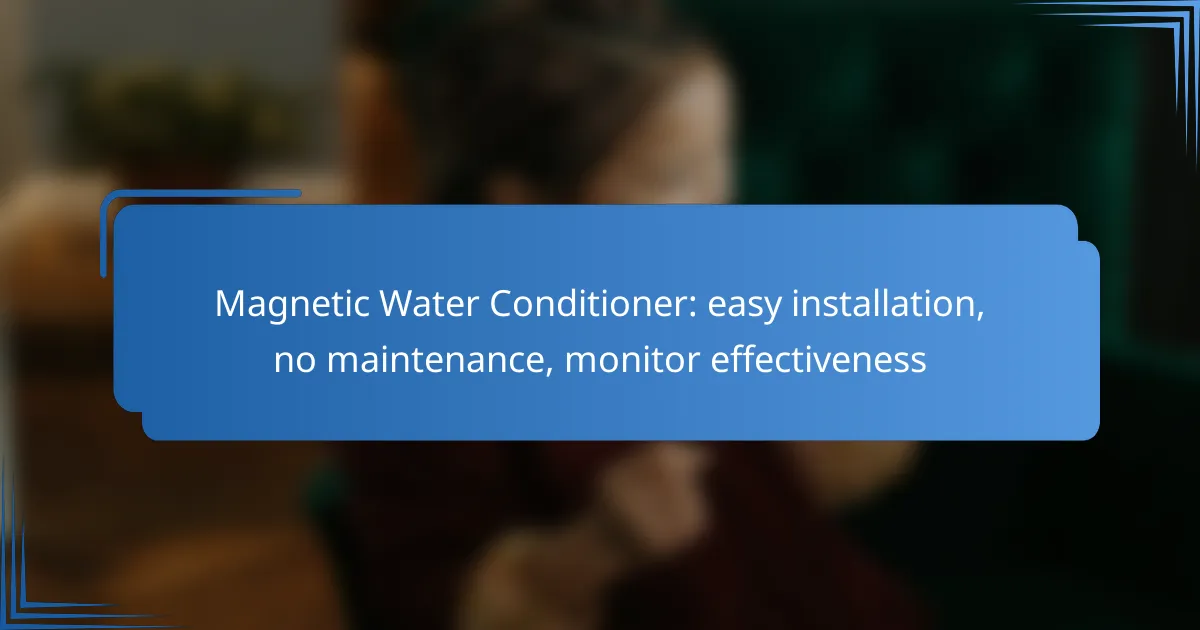A magnetic water conditioner utilizes magnetic fields to modify water properties, effectively reducing scale buildup in plumbing systems. Designed for easy installation and requiring no maintenance, these devices provide a hassle-free solution for homeowners looking to improve water quality without the use of chemicals.
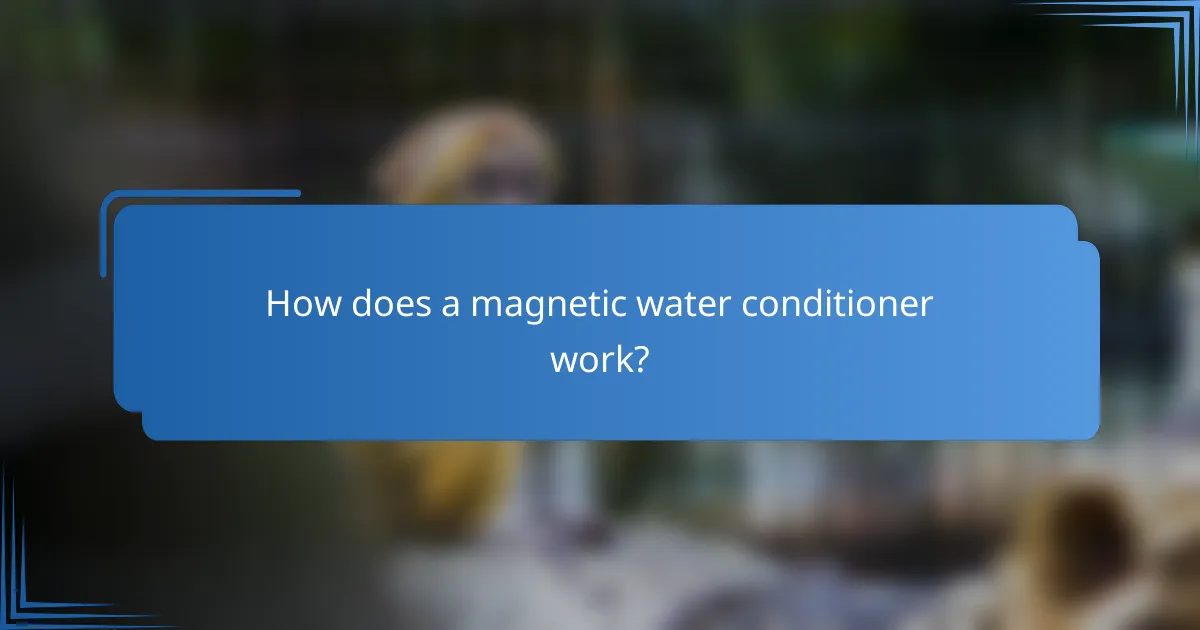
How does a magnetic water conditioner work?
A magnetic water conditioner works by using magnetic fields to alter the properties of water, which can help reduce scale buildup in plumbing systems. This technology is designed for easy installation and requires no ongoing maintenance, making it a convenient choice for homeowners.
Magnetic field alters water properties
The magnetic field generated by a water conditioner affects the physical and chemical properties of water molecules. This alteration can lead to changes in how minerals, such as calcium and magnesium, behave in water, preventing them from forming hard deposits. As a result, water treated with a magnetic conditioner may have improved flow characteristics and reduced hardness.
Users often report that the treated water feels softer and may enhance the effectiveness of soaps and detergents. The magnetic treatment does not change the water’s chemical composition but influences how minerals interact with surfaces and each other.
Reduces scale buildup in pipes
By changing the behavior of minerals in water, magnetic water conditioners can significantly reduce scale buildup in pipes and appliances. This can lead to longer-lasting plumbing systems and appliances, as less scale means fewer blockages and reduced wear. Homeowners may notice improved water flow and efficiency in heating systems as a result.
To maximize the benefits, it is advisable to install the conditioner at the point where water enters the home. Regular checks can help ensure that the system is functioning effectively, although maintenance is minimal compared to traditional water softening systems. Avoiding high mineral content water sources can further enhance the performance of the conditioner.
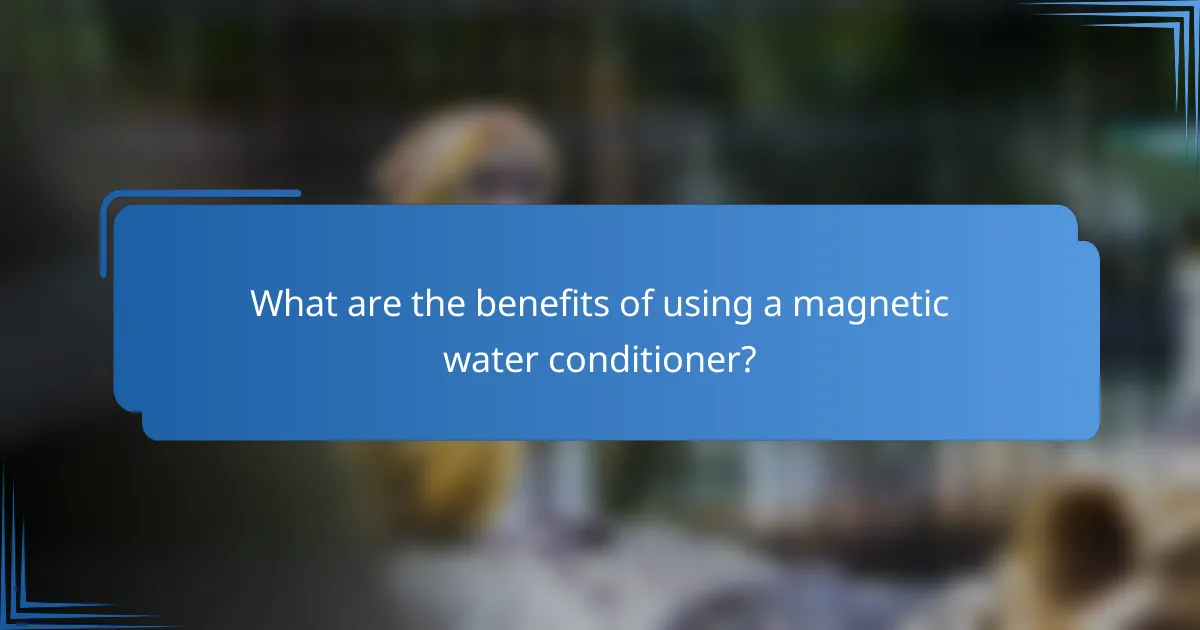
What are the benefits of using a magnetic water conditioner?
Magnetic water conditioners offer several advantages, including improved water quality and reduced scale buildup without the need for chemicals. They are particularly appealing for homeowners seeking a low-maintenance solution to water treatment.
No maintenance required
One of the main benefits of magnetic water conditioners is that they require no ongoing maintenance. Unlike traditional water softeners that need regular salt replenishment and cleaning, magnetic systems operate passively. Once installed, they continuously work to reduce scale without user intervention.
This lack of maintenance not only saves time but also eliminates the costs associated with purchasing salt or other chemicals. Users can enjoy the benefits of conditioned water without the hassle of upkeep.
Easy installation process
Installing a magnetic water conditioner is typically straightforward and can often be done without professional help. Most systems are designed to be mounted on existing pipes, making the process quick and accessible for DIY enthusiasts. Basic tools are usually all that’s needed for installation.
Installation usually involves wrapping the device around the pipe and securing it, which can take less than an hour. This simplicity makes it an attractive option for those looking to improve water quality without extensive renovations or plumbing work.
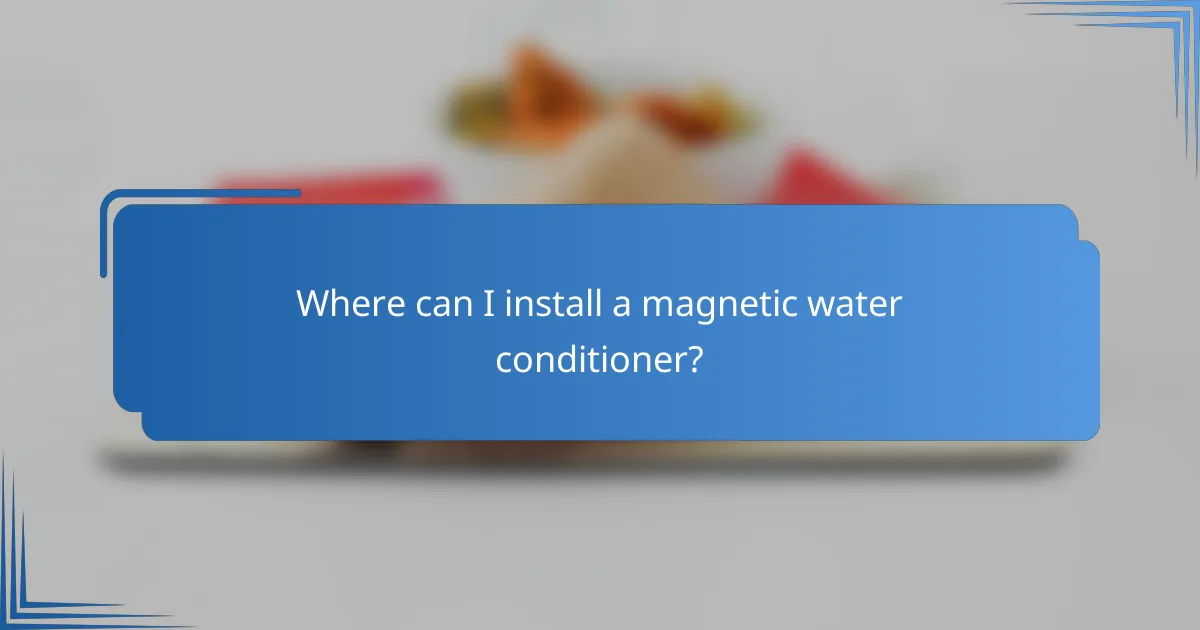
Where can I install a magnetic water conditioner?
A magnetic water conditioner can be installed in various locations, primarily in residential and commercial plumbing systems. These devices are designed to be versatile and easy to set up, making them suitable for different types of water systems.
Residential plumbing systems
In residential settings, magnetic water conditioners can be installed on the main water line, typically before it enters the home. This placement allows the device to treat all incoming water, which can help reduce scale buildup in pipes and appliances.
Installation is straightforward and usually requires minimal tools, as many models simply clamp onto the pipe. Homeowners should ensure that the device is compatible with their pipe material, whether it be copper, PVC, or PEX.
Commercial water systems
For commercial water systems, magnetic water conditioners can be installed in larger plumbing setups, such as those found in hotels, restaurants, and industrial facilities. These systems often require more robust units that can handle higher water flow rates.
When installing in a commercial environment, consider the specific water quality and usage patterns. It’s advisable to consult with a professional to determine the best location and model to ensure optimal performance and effectiveness in scale reduction.
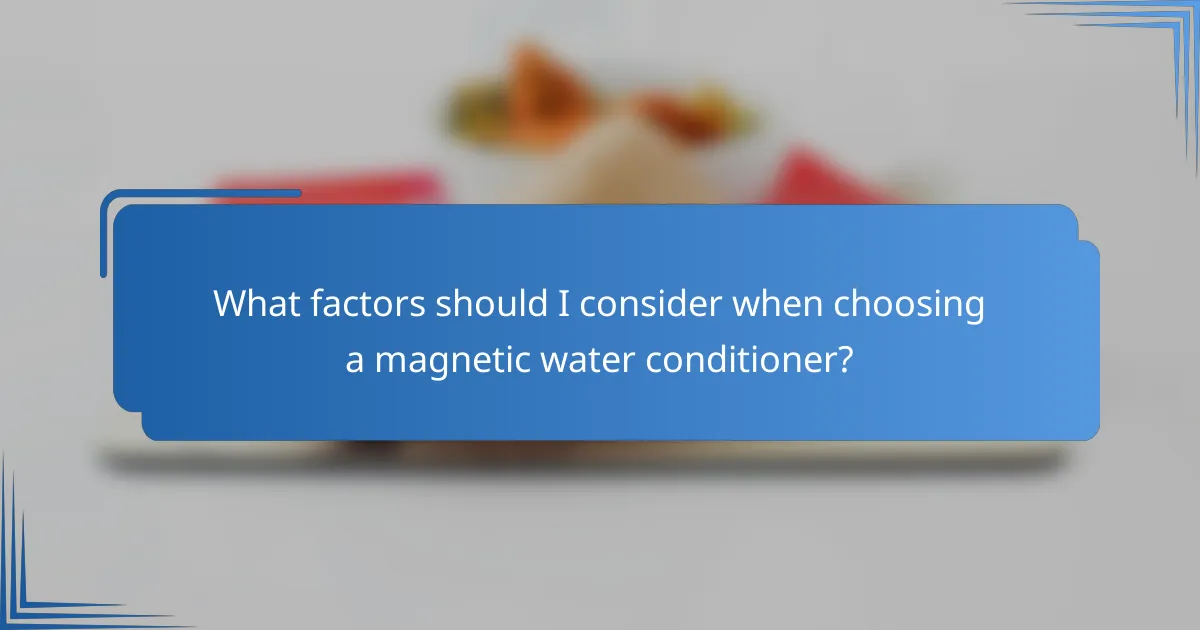
What factors should I consider when choosing a magnetic water conditioner?
When selecting a magnetic water conditioner, consider the water hardness levels in your area and the compatibility with your existing pipe materials. These factors will significantly influence the effectiveness and longevity of the system.
Water hardness levels
Water hardness is typically measured in grains per gallon (gpg) or parts per million (ppm). Most households experience hardness levels ranging from soft (0-3 gpg) to very hard (over 10 gpg). Understanding your water hardness will help you determine the appropriate magnetic water conditioner that can effectively reduce scale buildup.
For instance, if your water hardness is in the moderate range (around 4-7 gpg), a basic magnetic conditioner may suffice. However, for very hard water, you might need a more advanced model designed to handle higher mineral concentrations.
Pipe material compatibility
Different pipe materials react differently to magnetic water conditioners. Common materials include copper, PVC, and PEX. Ensure that the conditioner you choose is compatible with your plumbing to avoid any potential damage or inefficiency.
For example, magnetic conditioners generally work well with non-metallic pipes like PVC and PEX, while copper pipes may require specific models designed to prevent corrosion. Always check the manufacturer’s specifications to confirm compatibility with your plumbing system.
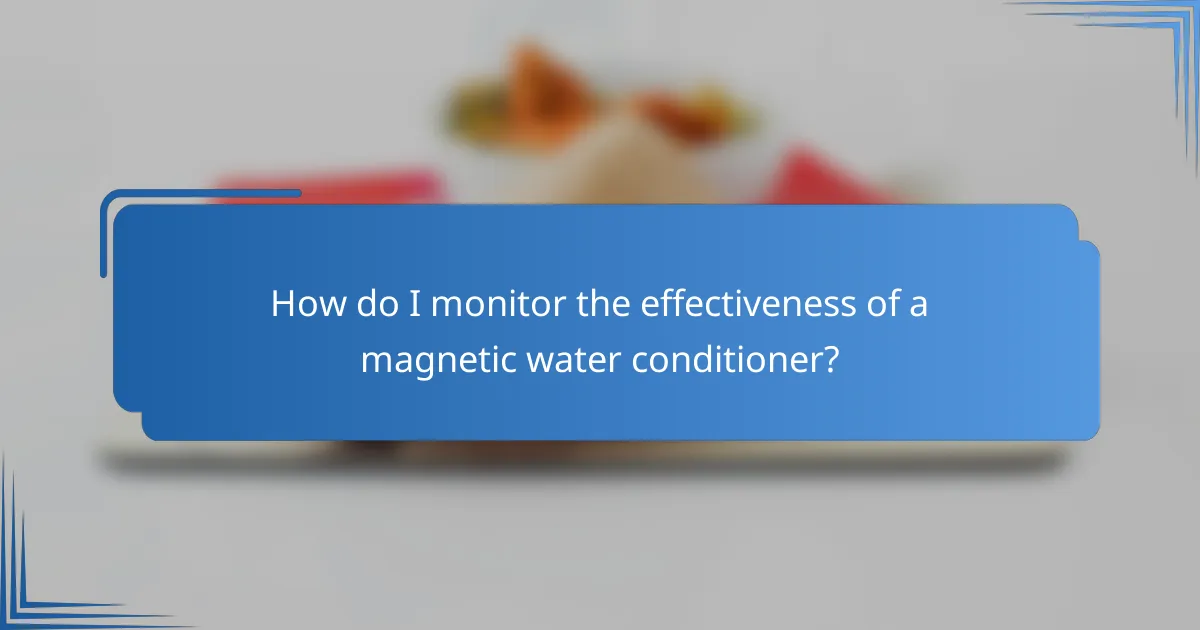
How do I monitor the effectiveness of a magnetic water conditioner?
To monitor the effectiveness of a magnetic water conditioner, you can use water quality testing kits and perform visual inspections for scale buildup. These methods help determine if the conditioner is reducing hardness and improving water quality.
Water quality testing kits
Water quality testing kits are essential tools for assessing the effectiveness of a magnetic water conditioner. These kits typically measure parameters such as hardness, pH, and mineral content. Look for kits that provide clear results and are easy to use, often available at home improvement stores or online.
When using a testing kit, conduct tests regularly—ideally every few months—to track changes in water quality. A significant reduction in hardness levels indicates that the conditioner is functioning properly. For best results, compare your findings against local water quality standards.
Visual inspection for scale buildup
Regular visual inspections can reveal the effectiveness of a magnetic water conditioner by checking for scale buildup on faucets, showerheads, and appliances. If you notice less scale accumulation over time, it suggests that the conditioner is working effectively to reduce mineral deposits.
Inspect areas prone to scale, such as water heaters and dishwashers, and look for any signs of corrosion or buildup. If scale is still present after a few months of use, consider adjusting the installation or consulting a professional for further evaluation.
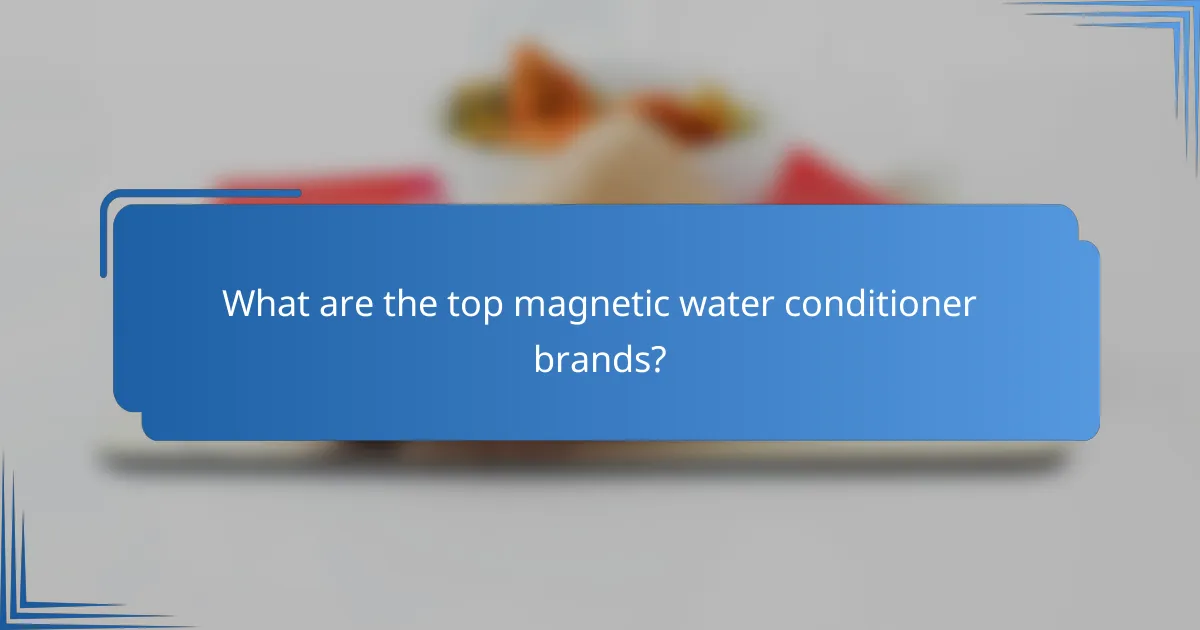
What are the top magnetic water conditioner brands?
The leading magnetic water conditioner brands include Magna-Flow and ScaleBlaster, known for their effectiveness in reducing scale buildup without the need for chemicals. These brands offer easy installation and require minimal maintenance, making them popular choices for homeowners seeking efficient water treatment solutions.
Magna-Flow
Magna-Flow is recognized for its innovative design that utilizes magnetic fields to alter the properties of water, preventing scale formation in pipes and appliances. Installation is straightforward, typically taking less than an hour, as it can be mounted on existing plumbing without any need for cutting or additional tools.
Users appreciate that Magna-Flow systems require no ongoing maintenance, which saves both time and money. The effectiveness can often be monitored through visual inspections of appliances and plumbing, with noticeable reductions in scale buildup over time.
ScaleBlaster
ScaleBlaster employs a unique electronic signal technology to combat hard water issues, making it a popular choice among homeowners. The device is easy to install, often fitting seamlessly into existing plumbing systems, and can be operational within a short time frame.
One of ScaleBlaster’s advantages is its ability to work on a wide range of water hardness levels, making it versatile for various household needs. Users can track its effectiveness by observing improvements in water quality and reduced maintenance on appliances, providing a clear indication of its performance over time.
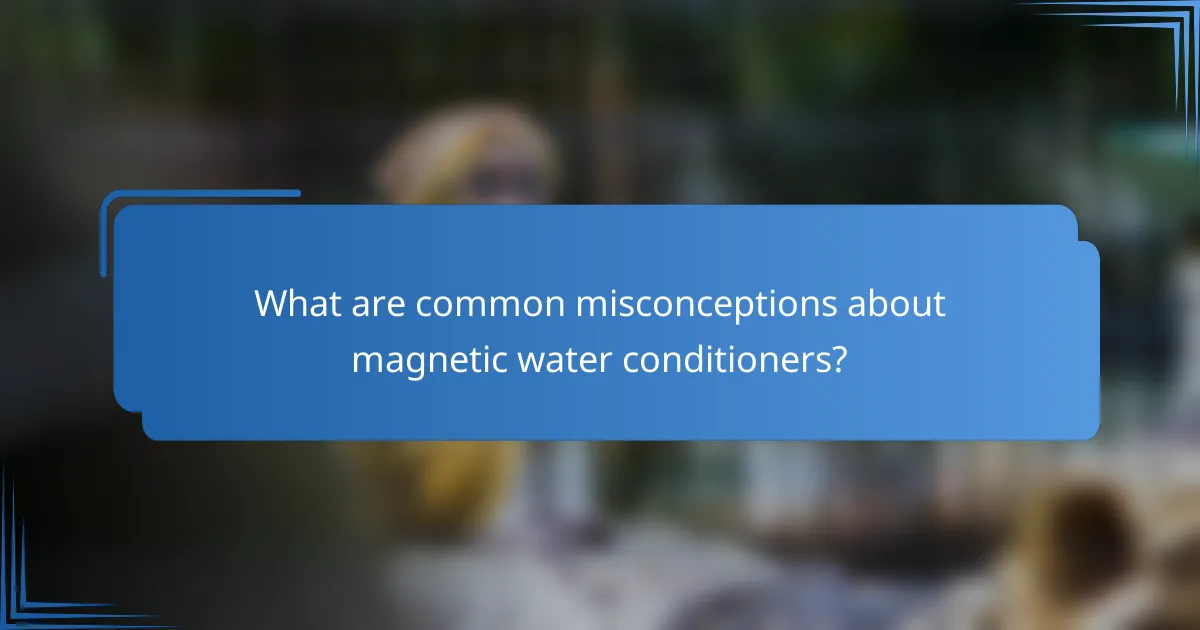
What are common misconceptions about magnetic water conditioners?
Magnetic water conditioners are often misunderstood, leading to several misconceptions about their functionality and requirements. Many people believe they need electricity to operate, and that they are ineffective for certain water types.
They require electricity
One common misconception is that magnetic water conditioners need electricity to function. In reality, these devices work passively by using magnets to alter the properties of water as it flows through the system. This means they do not require any power source, making installation straightforward and maintenance-free.
Since they operate without electricity, magnetic water conditioners can be installed in various locations, including homes and agricultural settings, without concerns about electrical connections or energy costs. This feature enhances their appeal for those seeking eco-friendly solutions.
They are ineffective for all water types
Another misconception is that magnetic water conditioners are ineffective for certain water types. While their effectiveness can vary based on water hardness and mineral content, many users report positive results across a broad spectrum of water conditions. They are particularly effective in reducing scale buildup in hard water.
It’s essential to consider that while magnetic conditioners may not completely eliminate all issues related to water hardness, they can significantly reduce scale formation and improve the overall quality of water. Testing your water can help determine if a magnetic water conditioner is suitable for your specific needs.
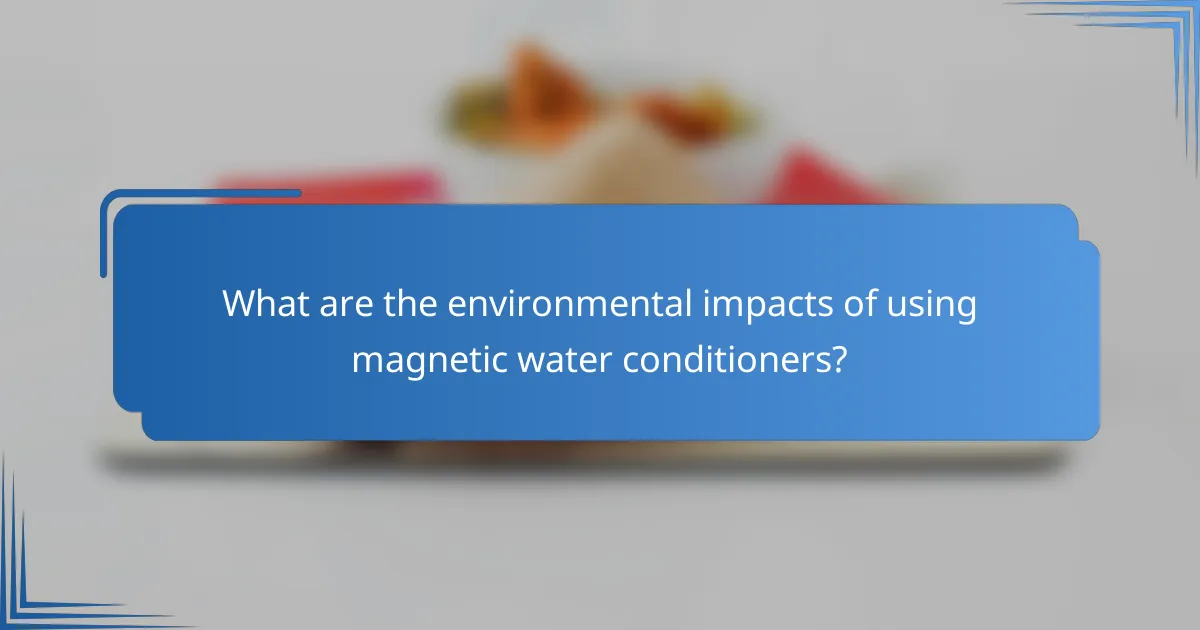
What are the environmental impacts of using magnetic water conditioners?
Magnetic water conditioners have minimal environmental impacts compared to traditional water treatment methods. They do not introduce chemicals into the water supply, making them a more eco-friendly option for water conditioning.
How do magnetic water conditioners work?
Magnetic water conditioners operate by using magnetic fields to alter the physical properties of water. This process can reduce the formation of scale and improve the solubility of minerals, which helps in preventing buildup in pipes and appliances.
These devices typically consist of magnets that are installed around the water pipes. As water flows through, the magnetic field influences the mineral particles, which may lead to less scaling and improved water quality.
What are the installation requirements?
Installing a magnetic water conditioner is generally straightforward and can often be done without professional help. Most units are designed to be clamped onto existing pipes, requiring no cutting or plumbing modifications.
Ensure that the device is placed on the main water line before it branches off to various fixtures. This positioning maximizes its effectiveness across the entire plumbing system.
What maintenance is needed?
One of the key advantages of magnetic water conditioners is their low maintenance requirements. Once installed, they typically require no ongoing upkeep, as there are no moving parts or filters to replace.
Occasional inspections to ensure the device remains securely attached and free from debris are advisable, but overall, these systems are designed for hassle-free operation.
How can effectiveness be monitored?
Effectiveness can be monitored by observing changes in water quality and appliance performance over time. Users may notice reduced scale buildup in kettles, dishwashers, and other appliances that use water.
Additionally, water hardness tests can be conducted periodically to measure the levels of calcium and magnesium in the water, providing a quantitative assessment of the conditioner’s impact.
